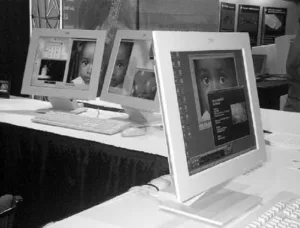
Unusually for the last few weeks, we have no event reports this week, although there is a lot of news in the build up to the NAB event and with already some activity starting on the build up to the SID this year. Events are an interesting topic this week, as Intel has announced that it is no longer running its annual Intel Developer Forum.
Over the years, I have heard vast amounts of speculation about the significance of companies appearing or not appearing at particular shows. Apple, famously, has not been to a general trade show for many, many years and even stopped going to the Macworld events after 2009. I remember one year when HP dropped out of a Las Vegas show (it could have been Comdex or CES) and there was lots of wild speculation about what it meant. My own view was that it simply meant that the cost/benefit analysis didn’t work on that occasion.
I used to be responsible for the spending on exhibitions for a brand and I long ago realised that the key reason for established brands to attend is to drive sales. Of course, for start-ups and those entering a market for the first time, it may be enough just to try to get some exposure. In MDM this week, we report on a novel dual display car stereo that won awards at CES and certainly will have received a lot more press attention and therefore exposure to consumers by appearing at the event. However, I learned to judge by sales results and to do that you really need to do a lot of work to track and analyse results. Just counting the numbers of visitors doesn’t do much good.
In the 1980s, as a sales manager, I was sent by my company to a new IT event that turned out to be something of a disaster from an attendance point of view. There were so few attendees that a delegation of exhibitors went to the organisers and demanded their money back! At that show, a buyer came to our booth, saw a particular monitor that was just the right size and design to fit his systems and over the next four or five years, I sold him around 14,000 monitors. However, over three days, he was probably one of ten or twenty sales leads in total!
I also remember a show that was a disaster because of heavy snow at the UK’s then new National Exhibition Centre. Although some of my staff made it to the booth (I think two were involved in traffic accidents!), there were almost no visitors at all for two days. The exhibitors that could get there ended up spending a lot of time talking to each other and I would be amazed if that didn’t lead to some big deals!
Anyway, getting back to Intel, the dropping of the IDF (and that headline might provoke excitement in some parts of the Middle East as a Google search on IDF brings up a lot of news about the ‘Israel Defence Force’!) does feel like one of those inflection points that I’m so keen on.
In the 1980s, I used to attend Comdex and every year there was a feeling that much would be decided by the attendees. Apple vs Microsoft, DR Gem vs Windows, OS/2 or Windows, Motorola vs Intel were big choices the industry seemed to be making at the event. Then Microsoft and Intel won and from then on, Comdex was about the details, not about the big picture. Microsoft and Intel or ‘Wintel’ continues to dominate the corporate computing market, but consumers are less interested and the Wintel architecture is no longer what drives the technology world. It is the sheer volume of smartphones and, in the future, the IoT that will drive the key technologies.
My guess is that Intel recognises that it needs to do something different to the IDF to have the impact it wants on the IoT and other future markets. But then again, somebody may have simply done a hard-nosed cost/benefit analysis.
Bob
IBM’s digital monitors from our IDF report in 1999 that focused on the new DVI interface. Image:Meko

